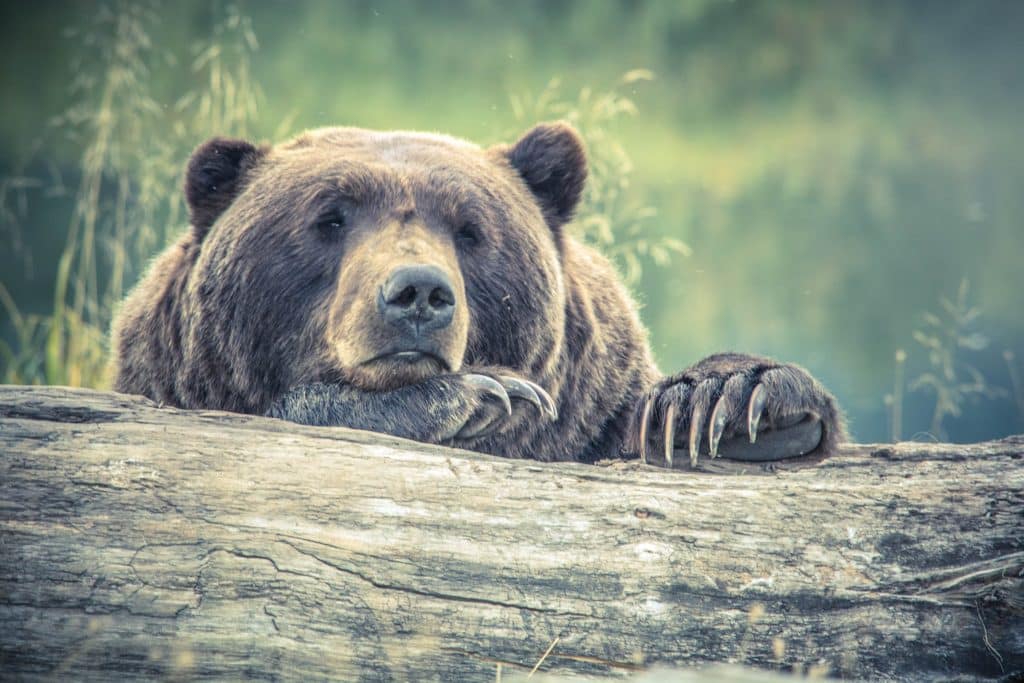Bears sure are a beauty to see in the wild, but that doesn’t mean I want to get close to one. When hiking and backpacking in bear country you need to be mindful. With a few precautions you should be able to keep black bears and grizzlies at an appropriate distance. If you do happen to encounter a bear you need to know how to survive an encounter.
Hiking In Bear Country
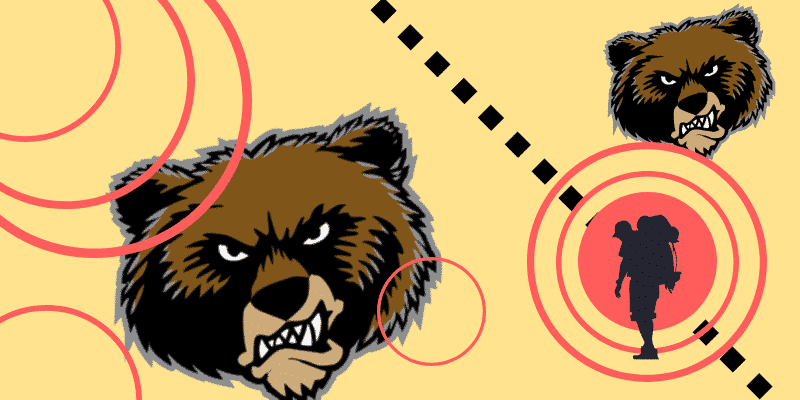
Most bears do their best to avoid people, but if you’re in the woods long enough you’ll eventually encounter one. Every time you go out into the woods you have a chance to run into a bear. Bears are naturally afraid of humans, but that doesn’t mean they won’t attack if provoked.
As more and more people start invading bear territory they start to become a little bit more adventurous. Most bears see humans as walking feed bags, leaving a trail of leftover food. It’s no surprise that more and more people are encountering bears on the trail.
Planning Your Hike in Bear Country
Before you head out onto the trail you need to learn about all the bear related regulations. Parks that have large bear populations put laws into place to protect them. A lot of parks require bear canisters and at the very least you need to learn how to hang a bear bag.
Most national parks that have a local grizzly bear population recommend carrying bear spray. The last time I was in Glacier national Park I brought a can of Frontiersman Bear Spray and kept it on my hip. A year later I went to Yosemite and found out bear spray wasn’t allowed with their local black bear population. Instead they recommend buying a bear bell to scare them off before the encounter.
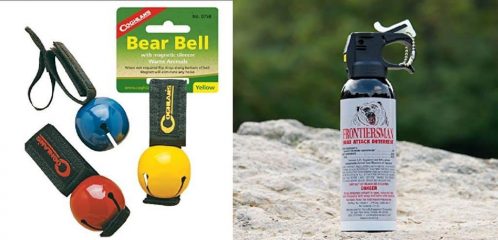
How To Avoid Bears While Hiking
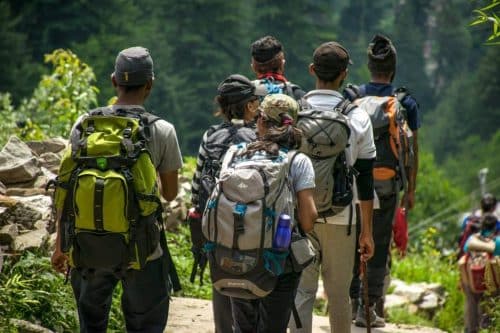
In areas with a lot of bears you never know when your going to have a chance encounter. You could do everything right and still walk up on a bear. That being said your main task while hiking through bear country is to simply avoid them. You never want to startle a bear, especially a mother with cubs. The following guide should help you avoid bears the next time you’re in the woods.
- Make Some Noise: By far the best way to avoid bears out in the field is just to make a little bit of noise. Talking, singing loudly, carrying a bear bell or simply clanking around with your trekking poles will do. Whatever you do don’t whistle or scream, because it might just sound like a wounded animal. The more noise you make the faster bears can get away from you.
- Don’t Hike At Dawn and Dusk: Bears are most active in the early mornings and right before dark. As tempting as that 7am hike seems you’re going to be much more likely to encounter a bear.
- Hike in Large Groups: Unless you’re an experienced hiker I would highly recommend hiking in a large group. Large groups are much less likely to be attacked and often make enough noise to scare them off in the first place. Not only will you scare off most bears hiking in groups you’ll have a smaller chance of getting lost.
- Carry Bear Spray: Bear spray should be your last resort out in the woods. Most sprays contain red pepper that will tear up a bears eyes. It’s designed to stop an attacking bear, but you’ll definitely get some blow back in your face. You’ll go through a whole can in under 10 seconds and then get the heck out of there. The key to bear spray is that you need to carry it directly in a holster on your hip. Bear spray works well 90 percent of the time, but it doesn’t do any good if you can’t get to it.
Keep Bears Out of Camp
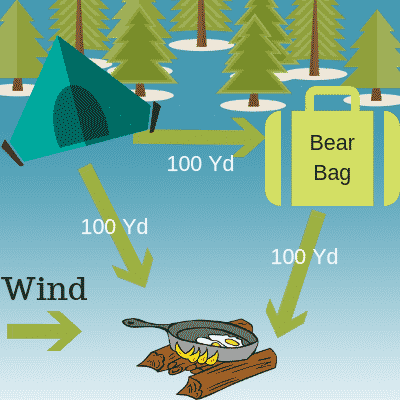
After a bear tastes human food it’s going to start hanging around camp becoming a problem. It’s not the bears fault, and unfortunately most of these bears are eventually killed. So for both your own safety and the bears keep the food away from them.
Bear Canisters are an absolute necessity for Backpackers that camp below 10,000 feet. If you’re going out into the woods bring along some type of bear canister or bear bag, personally I like the Bear Vault Canister. Even with a bear canister a curious bruin might just slink into your camp to investigate dinner aromas. Protect your food stash(and yourself) by pitching camp like the picture listed above.
- Choose a site with good visibility on all sides and use that for your kitchen. Centralize your dining odors and get out of there if you see a curious bear.
- Walk 100 yards away from your cooking sight and decide on a food storage area. Make sure you clean off all your pots and pans and stash all your dinner supplies here. Check out my post on hanging bear bags.
- Move 100 yards upwind of both locations and setup your main camp. Try to find flat ground with clear views of your kitchen and food storage area.
Other Tips To Keep Bears Away
- Don’t Leave Food Out Unattended: Frying some bacon on a unattended camp stove is a recipe for attracting bears. Try not to get side tracked and leave your food out for bears to investigate. Store your food safely in a bear canister/bear bag away from your camp at night.
- Properly Store Food: Store all of your food, snacks, empty food containers and clean cookware in your bear canister. Some people even store their cooking clothes and stove away from camp. The biggest problem a lot of campers face is bringing their personal hygiene products into camp. Bears are attracted to toothpaste, feminine products, sunscreen, bug spray and every little bit of trash.
- Keep Track of Human Waste: It sounds disgusting, but follow leave no trace principles when disposing of human waste. Bears are attracted to human waste so make sure you go off to do your business.
- Keep Cooking Odors Downwind: Setup your kitchen cooking area downwind of your camping area. You don’t want all those food odors wasping into your camp.
Bear Danger Signs
Hiking where bears are present(they’re present in more than 40 states) always requires a few precautions. These three signals are going to require extra caution when camping in bear country.
- Camping Signs: Keep an eye out for scratch marks in your fire pit, garbage at the site, or large piles of nearby poop. These are signs that bears have learned that they can associate campers with food. You can avoid problem bears by pitching your tent somewhere else.
- Forage: Towards the end of summer going into fall bears are going to be feeding on berries and nuts. Be especially loud when you come up near dense thickets.
- Scat: You can immediately tell when bears have been dining on meat. Look for runny, hairy droppings that smell horrible. If you see these signs it means there’s probably a carcass nearby which they’ll defend aggressively.
Black Bears Vs Grizzly Bears
Even though most bears are afraid of humans they are highly unpredictable and dangerous. Even when taking all safety precautions you might still run into a bear. Always keep your distance and try to figure out what type of bear your dealing with.
How you respond to a bear encounter will depend on which type of bear your dealing with. Most of the time it will be tough to tell the two bears apart, but eastern black bears tend to be dark black as opposed to brownish blond.
Black Bears: Black bears live throughout almost every state in the United States, but you’ll most likely see them around mountainous regions. Look for the black bears straight rounded back that and straight raccoon like face.
Grizzly Bears: Grizzly are mostly found in the Canadian and Alaska region, but they’ve been moving down into the northern most states of Wyoming, Idaho, Washington, Montana etc. You can tell a grizzly bear by its prominent shoulder Hump, concave face and rounded ears.
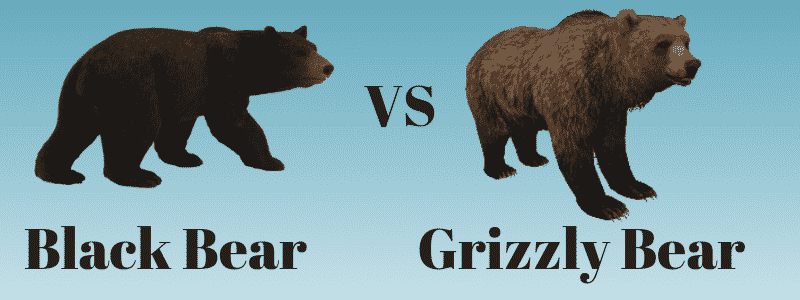
What To do if You Encounter a Black Bear
- Whenever you see a black bear keep your distance and never approach him. If he doesn’t see you back slowly away. If the black bear starts walking towards you raise up your arms to look big and yell loudly. Make as much noise as you can banging pans and throwing objects at him. Most of the times they’ll quickly scurry off. If he doesn’t back off grab a stick to try and beat him back.
- If you see a bear in camp quickly lock up all your food in a bear canister. Never let the bear get your food, because he won’t leave. If he continues to come at you quickly drop the food and get the heck out of their. Most of the time he’s only interested in the easy meal and will leave you alone.
Handle a Black Bear Attack
- Never play dead with a black bear. Black bears only attack when they intend to kill.
- If the black bear comes to attack you hopefully you have some bear spray. Spray him directly in the face and get ready to fight. He’s treating you as prey so you’ll have to fight for your life. Smash the bear in the face and beat up his eyes and nose with rocks and sticks.
Dealing With Grizzly Bear Encounters
- You’re going to have to treat grizzly bears completely differently. Never stand up and try to yell at a grizzly bear. If he stands up on his back feet he’s seeing if you’re willing to fight him. Calmly talk to him and stay aware of your surroundings. Back up slowly without turning your back and try not to look like a threat.
Handle a Grizzly Bear Attack
- If a grizzly bear charges you with it’s head low get ready to spray your bear spray. When it reaches 30 feet away spray him low so it doesn’t go over his head (don’t spray to soon).
- If your spray doesn’t work and you get knocked over by the bear play dead. Cover your neck and try to keep your backpack between you and the bear. Use your elbows and legs to keep your stomach to the ground. If he flips you over roll back on your stomach or roll into a ball. Most of the time grizzly’s will bite and leave you alone.

